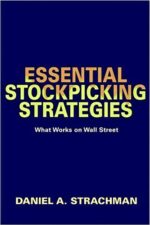Investing in Hedge Funds: Strategies for the New Marketplace
$18.59
Written by a professional investment adviser, Investing in Hedge Funds demystifies hedge funds and walks the consumer through the investment process step by step. This is the definitive guide to the increasingly popular hedge fund universe. Hedge funds are investments, run by fund managers, that use one or more alternative investment strategies, including investing in assets, such as currencies or distressed securities; hedging against market downturns; and utilizing return-enhancing tools, such as leverage and short selling. Consistency of return is typically the primary investment goal, not magnitude.
Introduction:
It is no secret to the investment community that market inefficiencies represent profit opportunities. Markets always seek to become efficient, but they have—and will continue to have—inefficiencies. In spite of this, the notions of perfect information, perfect competition, and theoretical equilibrium still haunt investors’ thoughts, even though they are concepts that exist only in the pages of introductory economics texts. In actuality, market disequilibrium—which requires a certain level of market inefficiency—is, as George Soros once said, “inherent in the imperfect understanding of the participants.” He went on to say that, “financial markets are inherently unstable, and the idea of a theoretical equilibrium . . . is itself a product of our imperfect understanding.”
The point is that as long as it takes time to communicate information, there will be information gaps, or inefficiencies, that result in a difference between the “real” or potential value of an asset and its market value. Hedge fund managers use informational, statistical, or strategic advantages to make intelligent, informed estimates of the real value of assets; take positions in those assets whose market value differs from their estimate; hedge out extraneous risk; and reap the returns when information about the asset becomes more readily available and the market reacts accordingly.
A great number of factors have contributed to the rapid growth of both hedge funds and hedge fund assets. Here are five that have been the most important:
- Opportunity. The continuing expansion of global markets and the ongoing development of new markets provides an expanding arena for investments. As long as economic conditions change and information flows imperfectly, markets will have inefficiencies. Markets are always striving to correct these inefficiencies because they represent profit opportunities. But while they remain, astute investment managers operating through the hedge fund investment vehicle provide investors with a way to capitalize on such inefficiencies.
- Tools and support services. New investment instruments and brokerage services continue to evolve and to become broadly available. The technology explosion has resulted in a rapid increase in the amount of information available to investors and the timeliness of that data. Likewise, ongoing increases in computing power allow market participants to analyze and process this information more quickly and more thoroughly. At the same time the cost of such products and services has been drastically reduced.
- Talent and expertise. As a result of the reduced cost of investment instruments, returns have become less dependent on large and costly infrastructure and the value of talented individuals has increased. One person with a personal computer can command more informational resources and analytical power today than was possible by an investment division on Wall Street in the mid-1980s. The human factor is a key to successfully applying investment capital to current opportunities. Investment funds naturally flow to those money managers who can offer specialized knowledge, expertise, and flat-out investment talent.
- Favorable markets. The 1990s’ bull market has helped the hedge fund industry as well as traditional investments. Because of the enormous amount of wealth that was created during that decade, hedge fund managers have found it easier to obtain initial investment capital. It often originates from family and friends interested in investing a few million to back a new money management firm. The environment has also been conducive to the incubation of new investment businesses. Because many hedge fund managers have been able to generate profits early on, and so earn a percentage of the profits, a larger number of hedge funds have survived than would have in a less favorable market. To illustrate the point, consider that hedge fund managers earn 20 percent of the profits they generate. A new manager with $10 million under management that generates a 20 percent return earns $400,000. If the year were flat the business would earn only the 1 percent management fee, hardly enough to operate a new business for very long. A wealthier populace also means a larger potential investor base for private investments such as hedge funds. They are exempt from publicly registering their securities, but the exemption generally limits them to wealthy, or accredited, investors. However, the definition of who qualifies as a wealthy or accredited investor was written over half a century ago. Needless to say, the number of persons that qualify is significantly greater than at the time of drafting and continues to expand.
- Performance. Even with all other factors, the industry would not grow without producing results. With few exceptions, the investment strategies pursued by hedge fund managers have generated attractive risk adjusted returns.
Contents:
- What Is a Hedge Fund?
- The Hedge Fund Investment Structure
- Hedge Fund Strategies
- Fixed-Income Arbitrage
- Equity Market-Neutral
- Convertible Arbitrage
- Merger (Risk) Arbitrage
- Distressed Securities
- Event-Driven Strategies
- Macro Investing
- Sector Funds
- Equity Hedge
- Emerging Markets
- Short Selling
- Investing in Hedge Funds
- After the Initial Allocation
- The Future of Hedge Funds
Investing in Hedge Funds: Strategies for the New Marketplace By Joseph G. Nicholas pdf
| Author(s) | |
|---|---|
| Format | |
| Pages | 319 |
| Publication Year | 1999 |
1 review for Investing in Hedge Funds: Strategies for the New Marketplace
Only logged in customers who have purchased this product may leave a review.










Brayden Meadows (verified owner) –
The book is aimed at those who are curious about hedge funds and know little to nothing about what they are. If you have some working knowledge of hedge funds this book will not add much more.
– Liked the statistical review of the performance of the various hedge fund strategies from 1990-1997 in Chapter 3.
– The two pie charts at the end of the chapter clearly show how hedge fund managers have moved toward strategies that were performing better. The downside is all this information is about 16 years ago (1997), and the industry has probably moved on to other strategies now
– My take away is that hedge fund managers also exhibit the ‘herd’ mentality, and may not be that ‘smarter’ after all.
The authors firm definitely has access to some of the premier firms and it will be nice if they could regularly publish some of the summary charts in the book.
Good weekend read if you want to learn more about funds, but don’t think you will be much smarter by the time you are done.